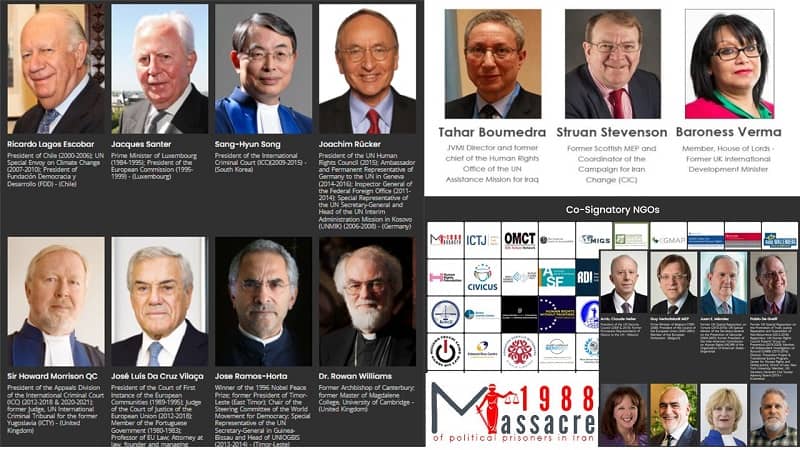
On January 27, the Justice for the Victims of the 1988 Massacre in Iran (JVMI) held a press conference in London to announce an initiative, put together by the global human rights community, in a bid to support an investigation by the United Nations into the 1988 massacre in Iran.
The JVMI is a non-profit organization, and a center for research and documentation, based in London that operates worldwide. Formed in 2016, the group consists of several members, from human rights lawyers, to former government officials, and even includes former Iranian political prisoners.
Among the speakers at the conference were the JVMI’s Director Tahar Boumedra, who also formerly served as the chief of the Human Rights Office for the UN Assistance Mission for Iraq (UNAMI), along with former Scottish MEP Struan Stevenson, who currently serves as the Coordinator of the Campaign for Iran Change (CIC).
During the conference, letters were unveiled, written by hundreds of international human rights and legal experts, as well as more than 100 current and former United Nations officials, that were addressed to the UN Human Rights Council and the High Commissioner for Human Rights.
Outlined in these letters were the shared beliefs that the 1988 massacre of political prisoners in Iran amounts to ‘crimes against humanity’ and ‘acts of genocide’. The letters also highlighted calls for an international inquiry to be established to finally bring the perpetrators of the massacre to justice.
In the summer of 1988, the Iranian regime’s then-Supreme Leader, Ruhollah Khomeini, issued a fatwa ordering the executions of over 30,000 political prisoners, the majority of whom were members and supporters of the regime’s main opposition, the People’s Mojahedin Organization of Iran (PMOI/MEK).
The JVMI’s Director Tahar Boumedra addressed the conference and said, “The appeal to the Human Rights Council and High Commissioner for Human Rights represents the largest international call on the UN in history by the international expert and human rights community to hold Iranian officials accountable over the 1988 massacre.”
The regime’s current President Ebrahim Raisi, along with the Judiciary Chief Gholam-Hossein Mohseni Ejei, have both been identified as key perpetrators of the massacre, and the letters unveiled during the conference cover the fact that both men have never been brought to justice for their crimes and “continue to enjoy impunity.”
In a joint letter from hundreds of signatories, the collective voice stated, “Therefore, we urge the UN Human Rights Council to urgently challenge the impunity enjoyed by Iranian officials by mandating an international investigation into the 1988 mass executions and enforced disappearances of thousands of political prisoners which constitute ongoing crimes against humanity.”
In Struan Stevenson’s speech, he stated, “We must send the clearest possible message to Ebrahim Raisi. His crimes will not be forgotten or forgiven. His victims and their families demand justice. He will be held to account for crimes against humanity, murder, human rights violations and genocide. The UN must launch a full investigation into these crimes and hold accountable all those involved. There must be no impunity for genocide and crimes against humanity.”